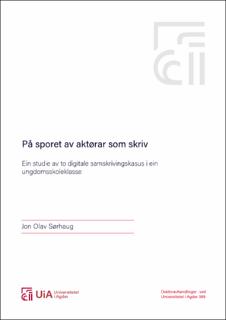På sporet av aktørar som skriv : Ein studie av to digitale samskrivingskasus i ein ungdomsskoleklasse
Original version
Sørhaug, J. O. (2022). På sporet av aktørar som skriv : Ein studie av to digitale samskrivingskasus i ein ungdomsskoleklasse [PhD. thesis]. University of Agder.Abstract
On the Trail of Actors Who Write is a study of two digital cases of collaborative writing in a Norwegian lower secondary school class. The study maps, analyzes and discusses the writing process in two collaborative writing groups, consisting of six students – in close collaboration with software, texts from the Internet and other digital actors, during three double lessons in February 2020.
The study applies socio-material theory to writing in school contexts. The conceptual framework is based on actor-network theory (ANT), theories of linguistic materiality, visual network analysis (VNA) and case study methodology. The collected material in the study consists of both quantitative and qualitative data: student texts and source texts, video and screen recordings, and also interviews with the teacher and students participating in the project.
Central to the study is the question of how human and digital actors interact while writing, and which role technology plays in this process. The study reveals that the student texts are produced through a number of negotiations and trials of strength between students, search engines, digital source texts and writing software. Search engines greatly influence the planning processes in that they select, prioritize and promote other actors' texts, and indeed specific parts of these texts. The source texts affect the composition of student texts by circulating, replicating and, in some cases, mutating the linguistic material into their texts. Writing software affects students' spelling through writing suggestions and corrective interruptions in the digital environment. The production of the student texts can thus be seen as transformations of linguistic material originating in the digital actors that participate in the writing process, and to some extent originating in the students themselves.
In several of the situations observed in these two collaborative writing cases, it is the digital actors that seem to have the greatest power of negotiation and impact. A practical implication for writing education can therefore be to strengthen lower secondary school students' critical approach and ability to negotiate with digital actors, so that students can make more independent choices while writing, also when collaboratively writing with each other and through digital technology.

